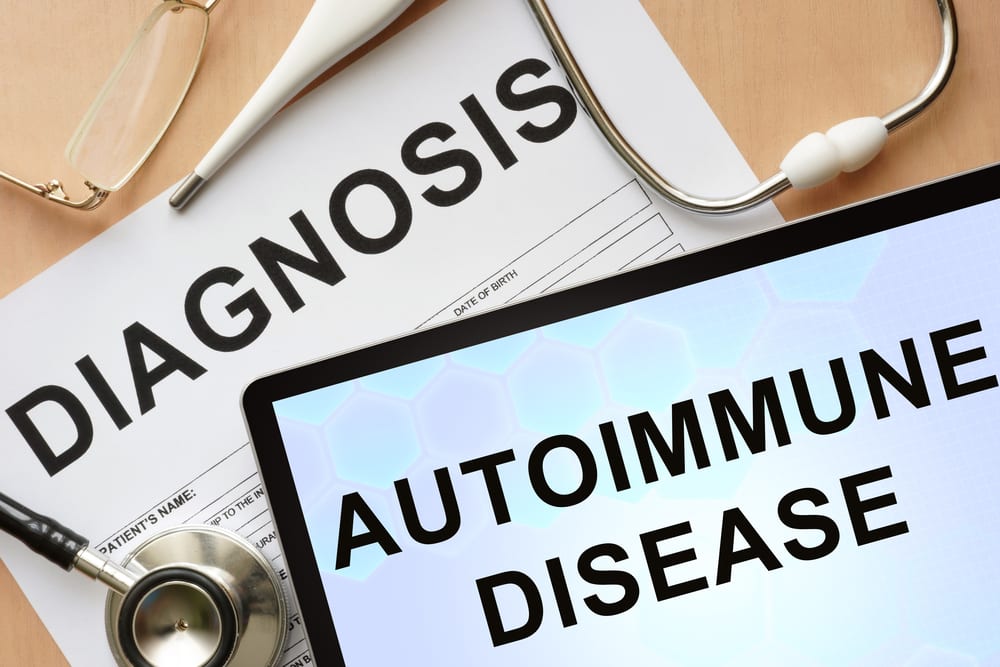Do you suffer from autoimmune symptoms or other chronic illnesses? Have you struggled with conventional treatment options? Discover more about the medical revolution of functional medicine!

DISCLAIMER: THIS WEBSITE DOES NOT PROVIDE MEDICAL ADVICE
The information on this website, including but not limited to text, graphics, images, and other material, is for informational purposes only. No material on this site is intended to be a substitute for professional medical advice, diagnosis, or treatment. Always seek the advice of your physician or other qualified health care provider with any questions regarding a medical condition or treatment before undertaking a new health care regimen, and never disregard professional medical advice or delay in seeking it because of something you have read on this website.
This post may contain affiliate links, which means I can receive a commission from any purchase made from the links. As an Amazon Associate, I earn from qualifying purchases. See the disclosure policy here.
Functional healthcare modernizes medicine with a more thorough approach to whole-patient care. Here, you will see a summary of the latest research on why functional medicine is the future and what you need to do to get control of your health.
This post discusses the importance of functional medicine in treating autoimmune disorders and chronic illnesses.

Rooted in Health: Functional Medicine for Root Cause Solutions
The demand for applied functional medicine in modern medical practices is rising. With the increase in chronic health conditions, conventional medicine adapts to new methods of diagnosis and treatment for patients with autoimmune disorders.
The Rise of Autoimmune Disorders
Currently, approximately 3-5% of the world’s population and 24 million people in the United States have autoimmune disorders. More than 100 autoimmune conditions exist, and the occurrence of developing autoimmunity has risen drastically over the last few decades.
These chronic conditions can be challenging to treat and manage with a conventional approach to treatment. Autoimmunity occurs when the body produces antibodies that attack its tissues, and it is complex and not wholly understood. Genetic factors, exposure to certain environmental toxins, and an imbalanced gut microbiome all lead to dysfunction in the immune system.
In recent years, much research has explored autoimmune disorders, diet, and the microbiome. There are two big concerns about such illnesses: 1. prevention and 2. treatment.
For those who are not getting better from conventional treatments and medications, it may be time to look for the root causes of your illness. Doctors trained to use the functional medicine framework can help.

Integrative and Functional Medicine
Functional Integrative medicine is an emerging field of holistic patient-focused care that uses systems biology to diagnose and treat all areas of disease-causing issues. It is a new way of thinking about how systems in the body function and how to work with them to bring health back to patients.
Unlike conventional medicine, the functional medicine framework assesses one’s lifestyle behaviors, environment, diet, and genetic expression and treats the cause of disease, not just the symptoms. Conventional healthcare is not a sustainable way to treat chronic health problems like autoimmune disorders. Therefore, the integration of functional medicine into traditional healthcare is critical.
Personalized diet modification is a tangible and effective way to limit environmental triggers that affect the microbiome and cause an autoimmune response, and it is vital to all treatment plans.
Learn more about Naturopath Medicine.

Functional Medicine Focuses on Your Environment
Autoimmune disorders are chronic conditions caused by complex interactions between a patient’s genetics and environmental factors. Such factors ignite autoreactive immune cells, affecting multiple areas of the body, leading to inflammation, cellular destruction, and loss of function of those organs and systems.
Autoimmune disorders caused by the production of autoantibodies are not completely understood. Therefore, chronic conditions like these are at the forefront of medical research.
Functional medicine is a patient-focused approach to identifying the root causes of disease by reviewing every aspect of one’s medical history, including genetics and environmental factors such as diet, stress, and exercise.

Functional Medicine and Gut Health
In conjunction with evidence-based medicine, this treatment has proven successful for patients with autoimmune conditions. Patients with chronic illnesses see improvement with regulated diets, stress reduction, and exercise programs. Changing these factors dramatically affects gut health, which plays a significant role in immune response.
Functional medical doctors work with patients to identify the triggers that cause an immune response and develop a plan to regulate inflammation. They work with patients to learn about their lifestyles, genetics, environment, allergies, and stress.
Patients benefit from this interaction and become involved with their health. Identifying these environmental triggers is critical in preventing an autoimmune response and health degradation. Patients must learn how their bodies interact with their environment. This is the key to healing.
Western diets include many of these immune-triggering culprits and are an essential focus in research and patient care. More importantly, the Western diet negatively impacts gut health. Also, the processed foods we consume cause the production of autoantibodies (Petta, 2018).
Diet intervention can drastically improve symptoms and reform health.
All doctors need the best available evidence to provide appropriate patient care. Moreover, exploring patients’ health and lifestyle helps determine the root cause of an illness. This careful examination is vital to ongoing research and disease management.
Ultimately, functional medicine should be available to all patients with autoimmune disorders, and an individualized diet must be a part of every patient’s treatment plan.
Modernizing Medicine
Functional medicine is an evidence-based model of healthcare that centers around the patient. This treatment approach focuses on the patient’s genetic history and lifestyle. Similarly, a patient-focused approach allows the physician and patient to work together to determine the root causes of illness (The Institute for Functional Medicine, 2019).
However, it is not yet a priority in conventional medicine.
Medical training consists of a logical curriculum of math and sciences necessary to build a solid foundation of knowledge. General medical doctors analyze patients’ symptoms to generate a list of possible causes to make a differential diagnosis. Due to the swift evolution of technology, new diagnostics are becoming available. Accordingly, that shifts the way doctors and scientists understand disease pathology.
For generations, treating disease with a suitable pharmaceutical has become known as “the standard of care.” Recent technological developments allow for a deeper understanding of the biochemical pathways within the body.
Hence, these progressions are the future of diagnosing and treating the causes of dysfunction that lead to illness. Continued education for general physicians and other medical professionals is pertinent for the best ability to diagnose and treat all patients. So, you should ask your doctor if they have received training or find one who is up-to-date on the functional approach to healthcare.

Functional Medicine: The New Medical Revolution
The National Center for Disease Control and Prevention and Health Promotion (2020) estimated that 60% of all adults living in the United States have a chronic disease, and 40% of adults live with two or more. Thus, this account affected the national health expenditure of $3.6 trillion, which is expected to reach $6.2 trillion by 2028, according to the Centers for Medicare and Medicaid Services (2020).
The American Autoimmune Related Diseases Association, Inc. (AARDA) has identified more than 80 autoimmune disorders, and such diseases estimated by AARDA and the National Coalition of Autoimmune Patient Groups (NCAPG) to contribute to the national cost of healthcare by hundreds of billions of dollars (2011). Consequently, the functional medicine approach to addressing these healthcare issues developed from economic drivers such as the need for value-based healthcare at a lower cost.
The cost is too grand to remain limited by an outdated medical system. It is crucial to embrace new technology and innovations in science and medicine. The health and longevity of the population depend on responsible and adequate medical care. Statistics aside, this issue is personal. You or someone you love could inevitably get sick with one or more chronic conditions in their lifetime.
Presently, medicine is in a revolutionary period of technological advancements. The rise of new technology, such as instantly accessible digital data and innovations in microbiology, enables precision in the diagnoses and treatments of diseases that have never been attainable until now.
Functional Medicine Uses New Technology
In an interview with The Institute for Functional Medicine, Jeffrey S. Bland, Ph.D., illuminated how this new technology examines the biochemical pathways in which disorder occurs, allowing physicians to non-invasively acquire data about the state of a patient’s immune system (2018).
Biomarkers are an example of this technology. Biological markers are medical signs that can help track disease. For example, heart rate monitors, blood pressure readings, and urinalyses are popular tests that rely on biomarkers to measure patients’ health. Additionally, recent progress in genomics and molecular biology has revolutionized the treatment of diseases. New biomarkers in treating autoimmune disorders could be an indispensable tool for diagnosis.
This era of predictive analytics brings invaluable tools for preventing, diagnosing, and treating diseases (Zhang. 2020). The rapid evolution of technology, the historically high incidence of chronic health issues, and the cost burden demand a medical revolution.
Functional medicine provides this framework for preventing, diagnosing, and treating patients more effectively than traditional medical care. Together, these branches of medicine could offer exceptional and intuitive care.
Learn more about Chiropractic Medicine.
The Drawbacks of Conventional Medicine
The medical school curriculum consists of a logical order of chemistry, math, biology, and physics training. It has a model to diagnose and treat from a statistical norm by classifying the patient, otherwise known as differential diagnosis (Bland, 2018). The differential diagnosis is becoming unpopular in treating chronic diseases like autoimmune disorders. Thankfully, new technology enables functional medicine to diagnose and treat diseases more intuitively and precisely.
According to Terry Wahls, MD, a doctor who successfully treated her multiple sclerosis with changes to her diet and lifestyle, for hundreds of years, physicians diagnosed and named infections and treated them with a drug or technique. If the treatment positively affected symptoms, it became the standard of care (2014). This is a successful practice for treating acute illnesses, such as prescribing antibiotics to treat infectious diseases. However, more information is needed regarding identifying how autoimmune conditions arise.
Don’t turn your back on your doctor, though! Conventional medicine is sufficient for many reasons and remains valuable in Western healthcare systems. Medical schools offer exceptional training in crisis care but little about managing chronic illnesses (Bland, 2015). Functional medicine addresses what conventional medicine cannot. It is a personalized approach to healthcare.

Change Your Environment, Change Your Genes
Before new discoveries in epigenetics, scientists thought genes determined a person’s fate. Instead, changes within the body can alter gene expression. “Chronic disease is not genetically predetermined but results from a mismatch between our genes, environment, and lifestyle,” stated Bland and Hyman (2015, Cover Endorsement).
Small aberrations within cells cause changes in genetic expression. Diseases result from problems caused by complex metabolic changes and cellular dysfunction. Chronic conditions are challenging to treat without insight into biochemical pathways that functional medicine can provide.
The functional medicine framework addresses the whole patient and not just their symptoms. Likewise, with a trained physician’s help, people can change their environments and lifestyles to alter their genetic expressions. This is an effective way to prevent or manage chronic conditions such as autoimmune disorders.
Prioritizing Functional Medicine In Healthcare
New evidence-based data are revolutionizing the way both scientists and medical professionals operate. Still, few physicians use functional medicine to diagnose and treat chronic health conditions. Since many traditional medical schools have yet to offer functional medicine training, this type of health care is not yet standardized.
People may experience difficulties finding an experienced and qualified medical doctor who uses a functional medicine approach and can prescribe needed medication (Childs, 2019). The Institute for Functional Medicine states that education is how to gain the required skills to apply the latest science to clinical medicine (2020). Practitioners are encouraged to continue their education; functional medicine training is ideal for staying current on scientific advancements.
As for people who suffer from chronic health conditions, it is time to get involved with our health. The answers are out there, and finding a medical doctor that embraces functional medicine is the first step to finding a long-term solution.
Before newfound discoveries in epigenetics, scientists thought genes determined a person’s fate. Instead, changes within the body can alter gene expression. “Chronic disease is not genetically predetermined but results from a mismatch between our genes and environment and lifestyle,” stated Bland and Hyman (2015, Cover Endorsement).
Functional Medicine Provides Insight
Small aberrations within cells cause changes in genetic expression. Diseases result from problems caused by complex metabolic changes and cellular dysfunction. Chronic conditions are challenging to treat without insight into biochemical pathways that functional medicine can provide.
The functional medicine framework addresses the whole patient and not just their symptoms. Likewise, with a trained physician’s help, people can change their environments and lifestyles to alter their genetic expressions. This is an effective way to prevent or manage chronic conditions such as autoimmune disorders.
People may experience difficulties finding an experienced and qualified medical doctor who uses a functional medicine approach and can prescribe needed medication (Childs, 2019). The Institute for Functional Medicine states that education is how to gain the required skills to apply the latest science to clinical medicine (2020). Practitioners are encouraged to continue their education; functional medicine training is ideal for staying current on scientific advancements.
For people who suffer from chronic health conditions, it is time to get involved with their health. The answers are out there, and finding a medical doctor who embraces functional medicine is the first step to finding a long-term solution.

Functional Medicine Treats the Whole Patient
Functional medicine is critical in treating and preventing autoimmune conditions by using a systems-based, patient-focused approach to determine the underlying causes of illness. The analysis of current data supports the notion that the environment, more importantly, the diet, significantly influences patients’ health with autoimmune disorders.
Functional medicine analyzes physiological symptoms on all cellular, organ, and system levels. This treatment approach addresses the environment and the patient for a holistic and effective action plan. Functional medicine attempts to cure illness, not merely treat the symptoms.
Learn more about The Cleveland Clinic’s functional approach to treating chronic illnesses.
More References and Recommended Reading About Functional Medicine:
- American Autoimmune Related Diseases Association (AARDA) & National Coalition of Autoimmune Patient Groups (NCAPG). (2011). The Cost Burden of Autoimmune Disease: The Latest Front in the War on Healthcare Spending. American Autoimmune Related Diseases Association (AARDA). http://www.diabetesed.net/page/_files/autoimmune-diseases.pdf
- Bland, J. S., & Hyman, M. (2015). The Disease Delusion: Conquering the Causes of Chronic Illness for a Healthier, Longer, and Happier Life (Illustrated ed.). Harper Wave.
- Childs, W. (2019, November 20). 6 Downsides to Functional Medicine Patients Should be Aware of. Dr. Westin Childs | Thyroid & Health Supplements That Work. https://www.restartmed.com/downsides-to-functional-medicine/
- Campos, M. (2019, October 24). Leaky gut: What is it, and what does it mean for you? Harvard Health Blog. https://www.health.harvard.edu/blog/leaky-gut-what-is-it-and-what-does-it-mean-for-you-2017092212451
What You Need to Know About Preventing Autoimmune Disorders with Diet
- Chu, F., Shi, M., Lang, Y., Shen, D., Jin, T., Zhu, J., & Cui, L. (2018). Gut Microbiota in Multiple Sclerosis and Experimental Autoimmune Encephalomyelitis: Current Applications and Future Perspectives. Mediators of Inflammation, 2018, 1–17. https://doi.org/10.1155/2018/8168717
- Cordain, L., Eaton, S. B., Sebastian, A., Mann, N., Lindeberg, S., Watkins, B. A., O’Keefe, J. H., & Brand-Miller, J. (2005). Origins and evolution of the Western diet: health implications for the 21st century. The American Journal of Clinical Nutrition, 81(2), 341–354. https://doi.org/10.1093/ajcn.81.2.341
- Dutta, S. K., Verma, S., Jain, V., Surapaneni, B. K., Vinayek, R., Phillips, L., & Nair, P. P. (2019). Parkinson’s Disease: The Emerging Role of Gut Dysbiosis, Antibiotics, Probiotics, and Fecal Microbiota Transplantation. Journal of
- Neurogastroenterology and Motility, 25(3), 363–376. https://doi.org/10.5056/jnm19044
- Exclusive Interview with Jeffrey S. Bland, Ph.D., FACN, CNS. (2018, April 10). YouTube. https://www.youtube.com/watch?v=Qd4fnPXKOjQ&list=PLe1KWczkQkvD_7wbfKfOLaeAZpEGjhz22&index=14
- Food Additives & Petitions. (2020, January 13). U.S. Food and Drug Administration. https://www.fda.gov/food/food-ingredients-packaging/food-additives-petitions
- Fugger, L., Jensen, L. T., & Rossjohn, J. (2020). Challenges, Progress, and Prospects of Developing Therapies to Treat Autoimmune Diseases. Cell, 181(1), 63–80. https://doi.org/10.1016/j.cell.2020.03.007
Best Functional Medicine Doctors
- Functional Medicine for Residents & Medical Students. (2020, March 20). The Institute for Functional Medicine. https://www.ifm.org/functional-medicine/functional-medicine-in-practice/functional-medicine-for-residents-and-medical-students/
- Hills, R., Pontefract, B., Mishcon, H., Black, C., Sutton, S., & Theberge, C. (2019). Gut Microbiome: Profound Implications for Diet and Disease. Nutrients, 11(7), 1613, 1-40. https://doi.org/10.3390/nu11071613
- Leeming, E. R., Johnson, A. J., Spector, T. D., & Le Roy, C. I. (2019). Effect of Diet on the Gut Microbiota: Rethinking Intervention Duration. Nutrients, 11(12), 2862. https://doi.org/10.3390/nu11122862
- Locantore, P., Del Gatto, V., Gelli, S., Paragliola, R. M., & Pontecorvi, A. (2020). The Interplay between
- Immune System and Microbiota in Osteoporosis. Mediators of Inflammation, 2020,
- 1–8. https://doi.org/10.1155/2020/3686749
- Maki, K. C., Slavin, J. L., Rains, T. M., & Kris-Etherton, P. M. (2014). Limitations of Observational Evidence: Implications for Evidence-Based Dietary Recommendations. Advances in Nutrition, 5(1), 7–15. https://doi.org/10.3945/an.113.004929
- Martinez, K. B., Leone, V., & Chang, E. B. (2017). Western diets, gut dysbiosis, and metabolic diseases: Are they linked? Gut Microbes, 8(2), 130–142. https://doi.org/10.1080/19490976.2016.1270811
- National Center for Chronic Disease Prevention and Health Promotion. (2020, September 24). Chronic Diseases in America. Center for Disease Control and Prevention. https://www.cdc.gov/chronicdisease/resources/infographic/chronic-diseases.htm
The Pegan Diet by Dr. Mark Hyman, Functional M.D.
- Overview of Food Ingredients, Additives & Colors. (2018, February 6). U.S. Food and Drug Administration. https://www.fda.gov/food/food-ingredients-packaging/overview-food-ingredients-additives-colors#how
- Passali, M., Josefsen, K., Frederiksen, J. L., & Antvorskov, J. C. (2020). Current Evidence on the Efficacy of Gluten-Free Diets in Multiple Sclerosis, Psoriasis, Type 1 Diabetes, and Autoimmune Thyroid Diseases. Nutrients, 12(8), 2316, 1-26. https://doi.org/10.3390/nu12082316
- Petta, I., Fraussen, J., Somers, V., & Kleinewietfeld, M. (2018). Interrelation of Diet, Gut Microbiome, and Autoantibody Production. Frontiers in Immunology, 9. doi:10.3389/fimmu.2018.00439
- Roca-Saavedra, P., Mendez-Vilabrille, V., Miranda, J. M., Nebot, C., Cardelle-Cobas, A., Franco, C. M., & Cepeda, A. (2017). Food additives, contaminants, and other minor components: effects on human gut microbiota—a review. Journal of Physiology and Biochemistry, 74(1), 69–83. https://doi.org/10.1007/s13105-017-0564-2
- Seck, E. H., Senghor, B., Merhej, V., Bachar, D., Cadoret, F., Robert, C., Azhar, E. I., Yasir, M., Bibi, F., Jiman-Fatani, A. A., Konate, D. S., Musso, D., Doumbo, O., Sokhna, C., Levasseur, A., Lagier, J. C., Khelaifia, S., Million, M., & Raoult, D. (2018). Salt in stools is associated with obesity, gut halophilic microbiota, and Akkermansia muciniphila depletion in humans. International Journal of Obesity, 43(4), 862–871. https://doi.org/10.1038/s41366-018-0201-3
- Systems Biology & Functional Medicine: Chronic Disease Management with Jeffrey Bland, Ph.D. (2018, April 10). YouTube. https://www.youtube.com/watch?v=lHuipy4xa6s&list=PLe1KWczkQkvD_7wbfKfOLaeAZpEGjhz22&index=15&t=994s
The Autoimmune Answer: Using Functional Medicine to address the cause, eliminate symptoms, and optimize quality of life
- The Institute for Functional Medicine. (2019, December 17). Functional Medicine | IFM. https://www.ifm.org/functional-medicine/
- The Institute for Functional Medicine. (2020). Functional Medicine: AFMCP. The Institution of Functional Medicine. https://discover.ifm.org/afmcp/
- Van den Hoogen, W. J., Laman, J. D., &’ t Hart, B. A. (2017). Modulation of Multiple Sclerosis and Its Animal Model Experimental Autoimmune Encephalomyelitis by Food and Gut Microbiota. Frontiers in Immunology, 8, 1–24. https://doi.org/10.3389/fimmu.2017.01081
- Wahls, T. (2014). The Wahls Protocol: A Radical New Way to Treat All Chronic Autoimmune Conditions Using Paleo Principles (Illustrated ed.). Avery.
- Weiss, G. A., & Hennet, T. (2017). Mechanisms and consequences of intestinal dysbiosis. Cellular and Molecular Life Sciences, 74(16), 2959–2977. https://doi.org/10.1007/s00018-017-2509-x
- Xu, H., Liu, M., Cao, J., Li, X., Fan, D., Xia, Y., . . . Zhao, H. (2019). The Dynamic Interplay between the Gut Microbiota and Autoimmune Diseases. Journal of Immunology Research, 2019, 1-14. doi:10.1155/2019/7546047
- Zhang, X., Chen, B.-, Zhao, L.-, & Li, H. (2020). The Gut Microbiota: Emerging Evidence in Autoimmune Diseases. Trends in Molecular Medicine, 26(9), 862–873. https://doi.org/10.1016/j.molmed.2020.04.001
- Zhang Z. (2020). Predictive analytics in the era of big data: opportunities and challenges. Annals of translational medicine, 8(4), 68. https://doi.org/10.21037/atm.2019.10.97
- Zhou, B., Yuan, Y., Zhang, S., Guo, C., Li, X., Li, G., Xiong, W., & Zeng, Z. (2020). Intestinal Flora and Disease Mutually Shape the Regional Immune System in the Intestinal Tract. Frontiers in Immunology, 11, 1–14. https://doi.org/10.3389/fimmu.2020.00575
This post was all about how functional medicine is revolutionizing the outcome of living with autoimmune disorders and other chronic diseases.






